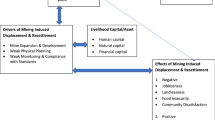Abstract
India is a country of unparalleled diversity within both the cultural and ecological spheres of life. This paper examines the author’s experience exploring and inquiring into the mental health implications of mining and mining induced displacement within several Adivasi (tribal) communities in Andhra Pradesh, India. Through collaboration with Samata, a local Non-Government Organization (NGO), a qualitative pilot study was conducted to explore potential effects of mining on three communities that have been threatened by mining for a number of years. A particular focus is paid to women and the unique challenges they currently face.
Similar content being viewed by others
References
Barik, B. C. (2003). Dams and displacement: who fills the bellies of the oustees? Rural Social Work, 8, 28–35.
Beetham, G., & Demetriades, J. (2007). Feminist research methodologies and development: overview and practical application. Gender & Development, 15, 199–218.
Brown, L. (1994). Subversive dialogues: Theory in feminist therapy. New York: BasicBooks.
Cernea, M. M. (1990). Internal refugee flows and development-induced population displacement. Journal of Refugee Studies, 3, 319–339.
Cernea, M. M. (1993). Social science research and the crafting of policy on population resettlement. Knowledge & Policy, 6, 176–201.
Cernea, M. M. (2003). For a new economics of resettlement: a sociological critique of the compensation principle. Social Science Journal, 37–45.
Downing, T. (2002). Avoiding new poverty: Mining-induced displacement and resettlement. Retrieved February 3, 2009 from http://www.ted-downing.com/Publications/AvodingNewPovMMSD.pdf.
Fernandez, W. (2008). Paying the price for someone else’s displacement. Retrieved, February 2, 2009 from http://infochangeindia.org/Agenda/Migration-isplacement/Paying-the-price-for-someone-else%E2%80%99s-displacement.html.
Fullilove, M. T. (1996). Psychiatric implications of displacement: contributions from the psychology of place. American Journal of Psychiatry, 153, 1516–1523.
Ghose, M. (2008). A perspective on community and state interests in small-scale mining in India including the role of women. Environment, Development and Sustainability, 10, 857–869.
Goode, E. (2003). Power of positive thinking may have a health benefit, study says. New York Times. Retrieved February 20, 2009, from http://www.nytimes.com/2003/09/02/health/power-ofpositive-thinking-may-have-a-health-benefit-studysays.html?scp=1&sq=&st=nyt.
hooks, B. (1984). Feminist theory: From margin to center. Cambridge: South End.
India Census. (2001). Basic data sheet: District East Godavari (14), Andhra Pradesh (28). Retrieved February 2, 2010, from http://www.censusindia.gov.in/Dist_File/datasheet-2814.pdf.
Kanango, S. D. (2004). Counselling families affected by socio-political factors and economic hardships. International Journal for the Advancement of Counselling, 26, 351–361.
Kayshap, L. (2004). The impact of modernization of Indian families: The counseling challenge. International Journal for the Advancement of Counselling, 26, 341–350.
Kuruvilla, A., & Jacob, K. S. (2007). Poverty, social stress & mental health. Indian Journal of Medical Research, 126, 273–278.
Mandelbaum, D. G. (1970). Society in India. Berkeley: University of California Press.
Marecek, J., Fine, M., & Kidder, L. (2001). Working between two worlds: Qualitative methods and psychology. In D. L. Tolman & M. Brydon-Miller (Eds.), From subjects to subjectivities (pp. 29–44). New York: New York University Press.
Maslow, A. H. (1943). A theory of human motivation. Psychological Review, 50(4), 370–396.
McDowell, T., Goessling, K., & Melendez, T. (2010). Transformative learning through international coursework: building multicultural sensitivity in family therapy and counseling. Journal of Marital and Family Therapy.
McDowell, T., & Fang, S. (2007). Feminist-informed critical multiculturalism: considerations for family research. Journal of Family Issues, 28, 549–566.
Pande, R. (2000). From anti-arrack to total prohibition: the women’s movement in Andhra Pradesh, India. Gender, Technology, and Development, 4(1), 131–144.
Pandey, P., Sehgal, A. R., Riboud, M., Levine, D., & Goyal, M. (2007). Informing resource-poor populations and the delivery of entitled health and social services in rural India: a cluster randomized controlled trial. Journal of the American Medical Association, 298, 1867–1875.
Parthasarthi, M. S., Durgamba, V. K., & Murthy, N. S. (2004). Counseling migrant families in southern India. International Journal for the Advancement of Counseling, 26, 363–367.
Posen, D. B. (1995). Stress management for patient and physician. The Canadian Journal of Continuing Medical Education. Retrieved February 10, 2009, from http://www.mentalhealth.com/mag1/p51-str.html.
Rosenquist, L. E. D. (2005). A psychosocial analysis of the human-sanitation nexus. Journal of Environmental Psychology, 25, 335–346.
United Nations High Commissioner for Refugees (December 2007). Handbook for the protection of internally displaced persons. Available at: http://www.unhcr.org/479498992.html.
van Teijlingen, E. R., & Hundley, V. (2001). Social research update: The importance of pilot studies. Retrieved December 18, 2009, from Surrey University Department of Sociology: http://sru.soc.surrey.ac.uk/SRU35.html.
Vindhya, U. (2007). Quality of women’s lives in India: some findings from two decades of psychological research on gender. Feminism & Psychology, 17, 337–356.
Author information
Authors and Affiliations
Corresponding author
Additional information
This author conducted this pilot-study prior to entering her current doctoral program and acted as an independent scholar. This work was made possible by guidance and support from everyone at Samata.
Rights and permissions
About this article
Cite this article
Goessling, K.P. Mining Induced Displacement and Mental Health: A Call for Action. Int J Adv Counselling 32, 153–164 (2010). https://doi.org/10.1007/s10447-010-9096-y
Published:
Issue Date:
DOI: https://doi.org/10.1007/s10447-010-9096-y




